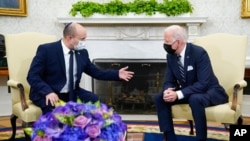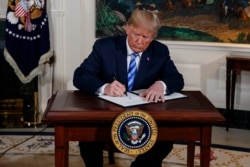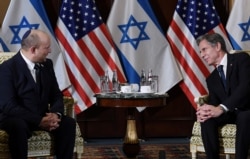After a delay of a day due to the crisis in Afghanistan, U.S. President Joe Biden hosted Israel's prime minister, Naftali Bennett, on Friday, discussing issues ranging from the plight of the Palestinians to Iran's nuclear weapons ambitions.
To ensure Iran never develops a nuclear weapon, Biden said at the White House, "we're putting diplomacy first and seeing where that takes us. But if diplomacy fails, we're ready to turn to other options."
The president did not elaborate on those other options and declined to take questions following his and Bennett's Oval Office comments.
"I was happy to hear your clear words that Iran will never be able to acquire a nuclear weapon and that you emphasize that we'll try the diplomatic route, but there's other options if that doesn't work out," the Israeli leader responded. "The first goal is to stop Iran on its regional aggression and start rolling it back into the box. And the second is to permanently keep Iran away from ever being able to break out the nuclear weapon."
Asked by VOA about the other options mentioned by the president, White House press secretary Jen Psaki responded at Friday’s daily briefing, “Any president has a range of options at their disposal. I'm not going to outline those from here.”
Iran nuclear deal
The United States and Iran have held several rounds of indirect talks about rejoining the 2015 international agreement that limited Iran's nuclear program in exchange for sanctions relief. That agreement came about amid concerns Iran was working to develop nuclear weapons, which it has denied.
Former U.S. President Donald Trump pulled out of the deal in 2018. Iran subsequently took steps away from its commitments, including boosting its stockpiles of enriched uranium and enriching the material to higher levels of purity.
The two leaders, in their first face-to-face meeting, also renewed a pledge to maintain the close relationship between their countries.
"The U.S. will always be there for Israel. It's an unshakeable partnership between our two nations," Biden said.
"You've always stood up for us, especially during tough times, like a few months ago, when thousands of rockets were being shot on Israeli towns and cities," replied the Israeli prime minister, who took office in June.
Losses in Afghanistan
Bennett also extended "condolences and deep sadness for the loss of American lives in Kabul. American service members lost their lives while on a mission to save other people's lives."
The chaotic U.S. withdrawal from Afghanistan, punctured by the suicide bombing Thursday outside Kabul's airport, which killed and wounded American military personnel and Afghan civilians, is also seen as having ramifications for the Middle East and the fight against terrorism.
"I just think everybody, and certainly the Israelis, have to be very concerned about what this does to evolving and empowering other terrorist regimes and certainly the Iranian question first and foremost," Matthew Brooks, executive director of the Republican Jewish Coalition, told VOA.
Both Bennett's and Biden's predecessors enjoyed a close relationship and were seen as being in sync on hardline policies toward the Palestinians, Iranians and regional security.
"You could tell that there was a great personal chemistry and a mutual respect and friendship" between Trump and Benjamin Netanyahu, Brooks said. "It was at a different level than the normal perfunctory kind of cordial relationships."
Bennett, the son of American immigrants to Israel, on Wednesday held separate meetings with Secretary of State Antony Blinken, Secretary of Defense Lloyd Austin and national security adviser Jake Sullivan.
Brooks said that while he considers Biden a friend of Israel, "on a number of critical policy issues he is absolutely misguided and wrong."
Bennett opposes the creation of a Palestinian state, as well as peace talks with the Palestinians. He supports the continued expansion of Israeli settlements in the disputed West Bank and has also expressed opposition to the Biden administration's plan to reopen a U.S. consulate for Palestinians in Jerusalem.
"It's clear that there is a very welcome interest from both the U.S. administration and the Israeli government in working well together and finding numerous areas of common ground and close collaboration," J Street, a group advocating American leadership to resolve the Israeli-Palestinian conflict, said in a statement. "At the same time, we believe it's also critical for the Biden administration to be transparent and firm in stating its disagreement with key aspects of Prime Minister Bennett's policies and worldview."
Bennett's career
Bennett, who made his fortune in Israel's high-tech industry, started his political career as Netanyahu's chief of staff in 2006. He later served in different ministerial positions from 2013 to 2020 under Netanyahu before ousting his former mentor after Israel's fourth parliamentary election in two years.
His fragile ruling coalition is composed of eight parties ranging across the political spectrum and includes a small Islamist faction representing Israel's Arab minority.
Bennett will be in office for two years, having agreed to a rotating government with Yair Lapid, who is set to take over as prime minister next year.
Noting the common challenges they face, from battling the coronavirus pandemic to combating terrorism, Bennett, after citing a biblical verse from the Book of Isaiah, told Biden they are both "a lighthouse in a very, very stormy world."
This is Bennett's first official foreign trip, although he did travel to Jordan for a then-secret meeting with King Abdullah.
The one-day delay in his meeting with Biden means Bennett, an observant Jew who does not travel on the Sabbath, will remain in Washington until after sundown Saturday.







